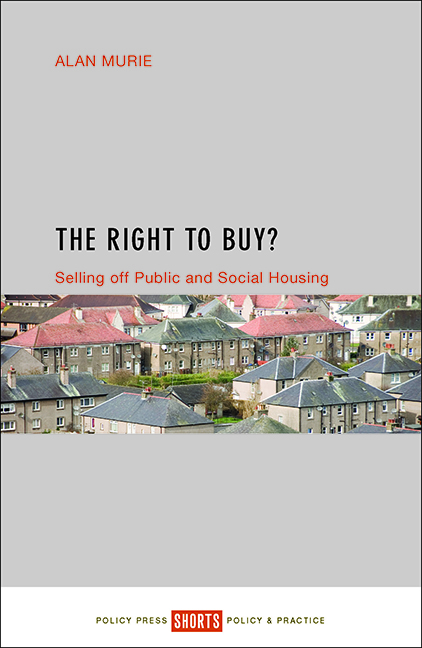Book contents
- Frontmatter
- Contents
- List of tables and figures
- About the author
- Acknowledgements
- 1 Introduction
- 2 Selling public housing: precursors and preconditions
- 3 A policy history of the Right to Buy, 1980-2015
- 4 Statistics and impacts of the Right to Buy
- 5 A policy commentary
- 6 The next phase: extending the Right to Buy in England
- 7 Conclusions: public and social housing: slow death or new beginnings?
- References
- Index
6 - The next phase: extending the Right to Buy in England
Published online by Cambridge University Press: 05 April 2022
- Frontmatter
- Contents
- List of tables and figures
- About the author
- Acknowledgements
- 1 Introduction
- 2 Selling public housing: precursors and preconditions
- 3 A policy history of the Right to Buy, 1980-2015
- 4 Statistics and impacts of the Right to Buy
- 5 A policy commentary
- 6 The next phase: extending the Right to Buy in England
- 7 Conclusions: public and social housing: slow death or new beginnings?
- References
- Index
Summary
Introduction
While the Right to Buy reduced the council housing stock, housing associations were sheltered from it and, from the mid-1980s, became the government's preferred vehicle for new rented housing. Housing associations also expanded rapidly through stock transfers stimulated by private finance and public policy, and by 2015 they provided more housing in England than local authorities. Very large housing associations have emerged with approaches to management, merger and business planning that reflected a belief in economies of scale. Some had lost the distinctiveness associated with their histories and where and why they initially operated. In 2015, however, there were proposals to extend the Right to Buy to housing associations in England.
Policy debates
In the lead-up to the 2015 general election there were a series of press stories about Conservative Party ideas for electorally attractive policies, and plans to further extend the Right to Buy in England. Conservative governments since the mid-1980s had favoured housing associations (rather than local authorities) as the vehicles to provide new rented housing, promote low cost home ownership and manage rented housing: private finance, regulation that gave comfort to private lenders and government grants supported the growth of housing associations. By 2015 however the leadership of the Conservative Party had moved away from this position and had become highly critical of housing associations. The origins of this shift in position are not entirely clear but seem to have been stimulated by contributions through the new generation of political think tanks seeking to influence government rather than objectively assess evidence. A paper jointly written by a Conservative and a Labour MP (Davis and Field, 2012) and published by the ‘progressive’ Institute for Public Policy Research, argued for the extension of the Right to Buy to housing association tenants and the reinvestment of capital receipts, This paper wrongly asserted that the collapse in the rate of sales under RTB after 2004 could be attributed to reductions in the average discount and to stock transfers. Another paper (Morton,2012) published by the Policy Exchange (supported by senior figures within the Conservative Party) presented an argument for the sale of high-value public housing to generate funds to invest in housing.
- Type
- Chapter
- Information
- The Right to Buy?Selling off Public and Social Housing, pp. 121 - 152Publisher: Bristol University PressPrint publication year: 2016



